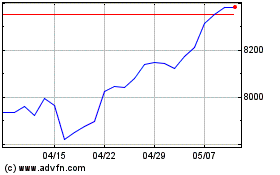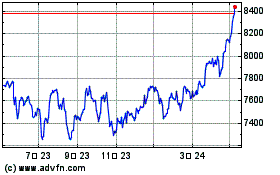British Pound Drops on Rising Rate-Cut Expectations
2020年1月14日 - 12:27AM
Dow Jones News
By Avantika Chilkoti
The British pound fell below $1.30 Monday amid growing
expectations of an interest-rate cut by the Bank of England.
The currency's decline followed disappointing economic data and
comments from U.K. central bank officials in recent days indicating
a willingness to cut rates. The weak economic figures suggested
uncertainty around Brexit has hurt the U.K. economy more than many
analysts had expected.
The pound fell 0.6% against the dollar, reaching its lowest
level since Dec. 25. It has dropped around 2% in 2020.
At the start of the year, few investors forecast the Bank of
England's policy rate would fall in 2020. But those expectations
have shifted amid further uncertainty around the U.K.'s trade
relationships after Brexit.
The U.K. is set to leave the European Union on Jan. 31, although
its current access to European Union markets will continue until at
least the end of the year while a long-term trade deal is hashed
out.
On Thursday, central bank Gov. Mark Carney said policy makers
were prepared to take "prompt" action if economic weakness
persists. Two members of the bank's monetary policy committee have
spoken out since, suggesting they would vote for a rate cut if
economic data don't improve.
"They have got a coordinated message going out that we are not
going to stand by and wait for evidence that the economy has
bounced back," said John Wraith, who covers U.K. rates strategy and
economics for UBS.
The probability of a 25 basis-point cut in the policy rate --
from the current level of 0.75% -- at the Jan. 30 meeting has risen
to 49% from 5% at the start of last week, according to CME futures
data.
Adding to expectations of monetary loosening, official estimates
out Monday showed U.K. gross domestic product fell 0.3% in November
from the previous month. That compared with expectations for 0.1%
growth in a survey of economists by The Wall Street Journal.
The U.K.'s FTSE 100 equities benchmark gained 0.3% Monday, while
the FTSE 250, which includes companies with a greater focus on the
domestic economy, was up 0.9%.
Meanwhile, the yield on 10-year U.K. government bonds fell to
0.733% from 0.772% Friday.
Analysts at Investec said the move in sterling showed that
economic data and central bank commentary have "regained their
mojo" as the primary drivers of the currency. However, Brexit and
EU trade talks are expected to regain influence on the currency in
the longer term, the analysts said.
Write to Avantika Chilkoti at Avantika.Chilkoti@wsj.com
(END) Dow Jones Newswires
January 13, 2020 10:12 ET (15:12 GMT)
Copyright (c) 2020 Dow Jones & Company, Inc.
FTSE 100
指数チャート
から 3 2024 まで 4 2024

FTSE 100
指数チャート
から 4 2023 まで 4 2024
